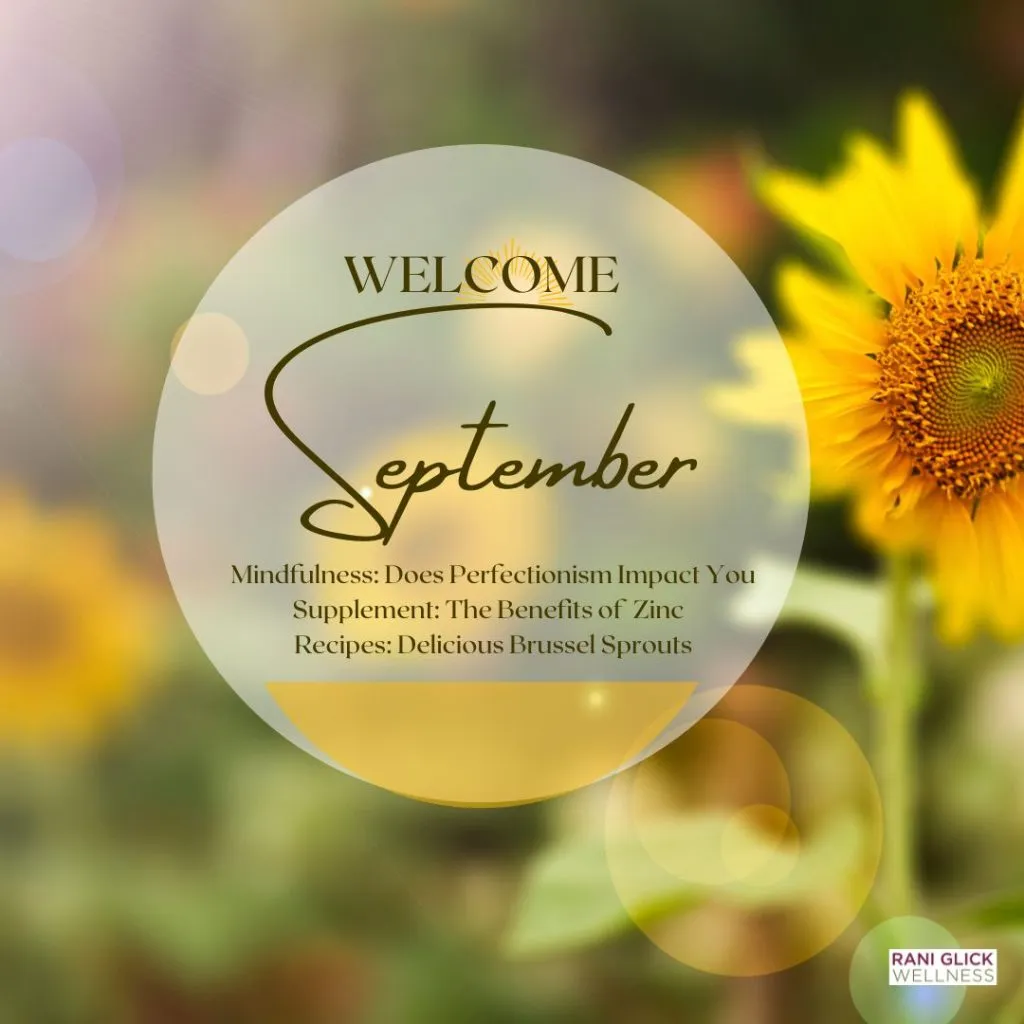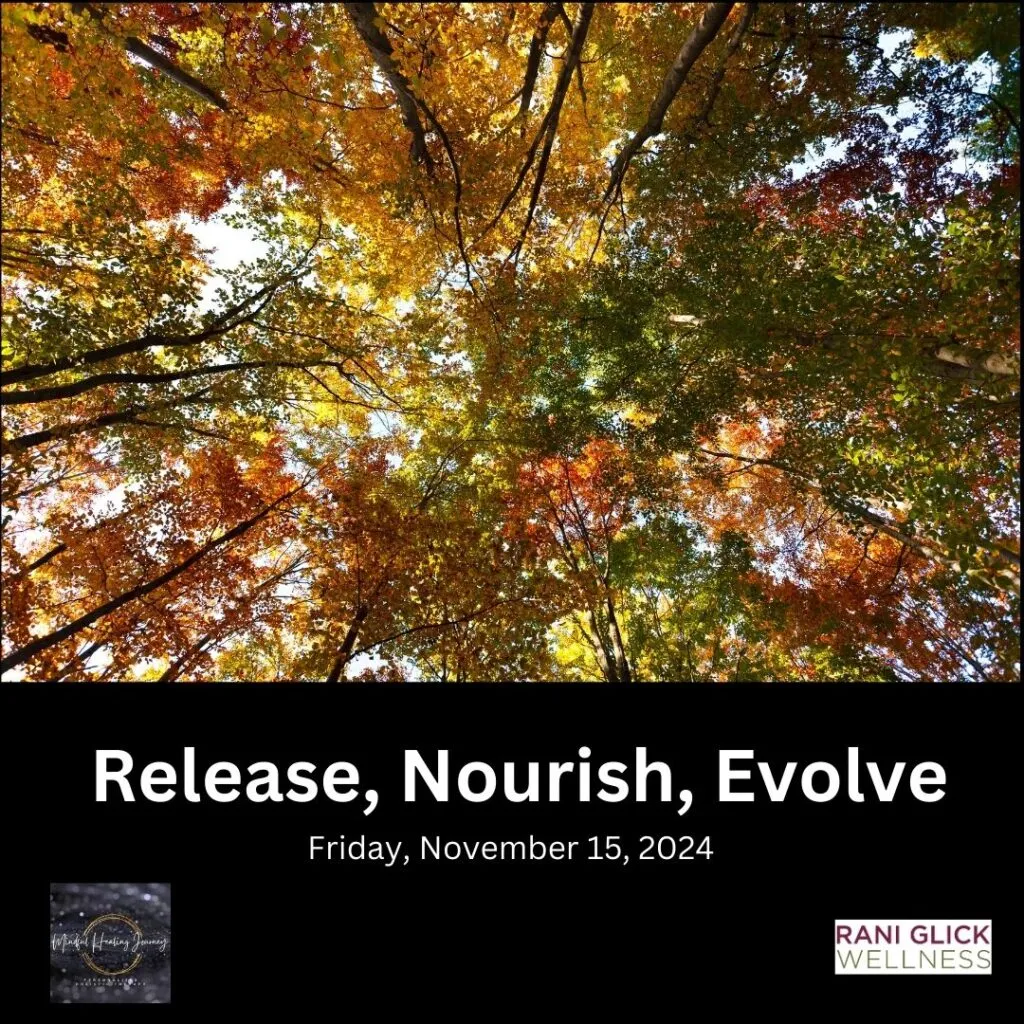

Welcome September! Summertime is not yet over! You don’t have to begin planning for the fall and winter yet. How can you hold onto that free, open and relaxed state of summer for the next six months until spring comes again? September has its benefits where new possibilities emerge to imagine a new slate.
In this issue, I am exploring perfectionism with mindfulness, the benefits of zinc supplements and enjoying Brussel sprouts in three different recipes. I’ll be travelling for the month of September to Scotland, Ireland and The Netherlands. Check out Practice Together and recordings of meditations and somatic movement sessions to listen to.
Take a look at What’s Coming Up this Fall and sign up as we’ll be in full swing on October 1st..
- Article: How Does Perfectionism Impact You?
- Supplement: The Benefits of Zinc
- Recipes: A different choice of vegetable for September – Brussel Sprouts
- Events: What Coming Up This Fall
Article: Mindfulness: : How does perfectionism impact your life?
I never believed I strove for perfectionism in myself, work or home life. I thought, if I could get things done it was good enough. When I started to investigate perfectionism from the perspective of overeating, I discovered that some of my habits were hidden traits of perfectionism. It’s not only with my relationship to food, but my relationship to myself and how I interact in the world.
Perfectionism, adds another level of stress striving to keep things in their tidy boxes and presenting a pristine front that everything is under control. I am not a very structured person. I function by my intuition, sensing, observing and structure is a guide how to live.
Looking at perfection has secretive elements for hiding insecurities or feelings of not being good enough. Many people, mostly women feel this way. We overcompensate to maintain a front of keeping up that we think are measures of success and perfection for fear of exposing our real inadequacies.
Where does perfectionism show up in your life? Does it keep you from:
- Setting high performance standards where you never get things done,
- Investing in significant amounts of time and energy, trying to meet impossible standards.
- Having difficulty finishing projects, that will never get done on time or keep on changing to get it perfect!
- Measuring your self worth by other’s accomplishments that confirm your outside measure of worthiness.
- Setting yourself up for dissatisfaction and disappointment – when you cannot meet your own standards.
- Overly critical and harsh in your self-evaluation and then turning on yourself.
- Feeling overly concerned about how others evaluate you – both from the outside and inside?
- Experiencing anxiety about potential failure since you’re worrying about how you come across to other people and their assessment of you, if not perfect.
- Pressure on others to be perfect too -relationships, parenting, work colleagues or friends.
How does this affect stress in your life?
It eats up a lot of time and energy! Leaving little time for self-care and living in the moment with joy!
Stress shows itself when expending too much mental and physical energy that triggers the fight or flight response and getting stuck in the sympathetic state of anxiety and stress. This comes from overworking, hiding your overeating, thinking you’ll never get everything done, can’t take a break, or have too much to do. You get stuck in maintaining a superficial outward appearance of having it all together, when you are really feeling shame, guilt or angst behind closed doors. It can begin to feel like living a double life!
Striving for perfectionism when you haven’t met your ideal mark often results in finding a place to relieve stress and anxiety, so you reach for food or other substances to soothe yourself.
Mindful awareness is the starting point for recognizing the extremes of perfectionism or sloppiness, right or wrong or good or bad. It can bring you into the moment of being centred, stepping back and seeing the patterns of perfectionism about yourself and your relationship to others. When returning to the parasympathetic state of rest or digest elicits calm, curiosity, connectedness, compassion and balance for accepting yourself and others.
Striving for good enough is in the middle, There is no such thing as perfect.
Flexibility, curiosity and self-acceptance break the cycle of perfectionism.
Like a pendulum you can balance in the middle of flexible rather than the extremes of perfection or sloppy that lessens perfectionist aspirations.
A healthy balanced lifestyle is a long term process, not a short -term pledge of pThe benefits of zinc in our diet can prevent the cycle of colds, viruses and much more..
Supplement: The Benefits of Zinc for allergies, colds, wound healing, digestion and immunity
I have underestimated the value of the mineral zinc. It is in our foods, personal products, cosmetics, and over-the-counter medicines for healing on a daily basis.
I rediscovered it because of my nasal allergies that repeatedly impacted my life throughout the year. When I recently researched its link to the interaction of viruses of the common cold creates a vicious cycle of increases the inflammation (attaching to a molecule called ICAM-1) causes an ongoing infection.
Zinc that is often lacking in our diet, when it binds to this molecule that prevents the virus attaching to it. Zinc helps to build your antiviral defenses. Over time and with regulation of diet, it works better with managing the symptoms rather than taking antihistamines.
You need small amounts of zinc every day for helping immune function, regulating hormone production, promoting growth and repair of cells, reducing inflammation, and fighting free radical damage infections, colds and healing wounds. It also helps with absorbing antioxidant enzymes, and glutathione peroxidase for detoxification.
This mineral has been an effective anti-inflammatory and antioxidant agent, fighting oxidative stress and decreasing the chance for disease occurring especially in elderly people.
One area that surprised me is for vision and eye health. Daily dosage of zinc may help reduce the risk for advanced stage age-related macular degeneration and vision loss.
Zinc deficiency is somewhat common around the world. A 2019 report estimates that up to 17 percent of the global population is at risk for low intake. This happens when not enough zinc-based foods are eaten or a person has trouble absorbing it from foods due to digestive disorders or poor gut health.
Signs of a zinc deficiency occur when frequently getting sick, chronic fatigue, changes in appetite, weight gain or loss, hair loss, poor concentration, more frequent colds symptoms, slowed wound healing, and hormonal problems – to name a few.
Zinc is found in protein foods such as red meat, poultry, fish, oysters, sardines, nuts and seeds (pumpkin, hemp and sunflower seed), lentils and eggs, yogurt, shitake mushrooms and yogurt. A plant-based diet has small amounts while animal products are the richest sources.
People who suffer from long-term health issues like sickle cell disease, severe stomach-acid issues, and chronic digestive problems like leaky gut syndrome or alcoholism are also more likely to have a zinc deficiency.
The best way to meet your needs is adding a daily supplement. Daily intake is important. The daily dosage is 15-50 mg. Take one capsule a day with food. You can increase your dosage when sick with a cold or infection. Your body will excrete what is doesn’t use or absorb.
There are different types of zinc:
- Zinc Bis-Glycinate is for daily use since the glycinate makes it easily absorbable It is often used in cold remedies like lozenges and nasal sprays.
- Zinc acetate. Like zinc glycinate, zinc acetate is often added to cold lozenges to reduce symptoms and speed up recovery.
- Zinc sulfate. In addition to helping prevent zinc deficiency, zinc sulfate has been shown to reduce the severity of acne.
- Zinc picolinate. Some studies suggest that your body may absorb this form better than other types of zinc, including zinc glycinate and zinc citrate.
- Zinc orotate. This form is bound to a compound known as orotic acid. It’s one of the most common types of zinc supplements on the market.
- Zinc citrate. One 2014 study Trusted Source showed that this type of supplement is as well absorbed as zinc glycinate but has a less bitter, more appealing taste.
It is available in capsule, tablet, and lozenge form, there are plenty of options to get your daily dose of zinc – whichever type you choose. Some studies show that nasal sprays containing zinc have been linked to loss of smell and should be avoided.
I use the glycinate Now or Can Prev brand as they are not expensive. Let me know which one you choose and how it works out for you!
Fresh whole foods are peaking this month in the fields and it’s a great time to take advantage of expanding your vegetable palate of greens and cabbages. One of my favourite September vegetables is fresh Brussel sprouts from the stalk. I love to break off the sprouts off the stalk. I feel I’m having a whole expereince of eating them than just picking from the box at the market (or they are previously packaged).
Health benefits of Brussel sprouts …
- Brussels sprouts (Brassica oleracea) are vegetablesfrom the cruciferous family, which also includes broccoli, cabbage, kale and other high-nutrient veggies.
- Cruciferous veggies are high in antioxidants that help fight free radical damage to your cells, build bones, supports the immune system, improves digestion by protecting the vulnerable lining of the digestive tract and stomach (preventative against leaky gut),
- These sprouts are high in fiber, calcium, potassium, folate, vitamin C and vitamin K.
- Certain nutrient compounds in Brussels sprouts can reduce oxidative stress damage to the eyes – protecting against blindness, cataracts and other complications. Eating high amounts of antioxidant-containing fruits and vegetables, specifically vitamin C and vitamin A, can lower the risk of macular degeneration. (See zinc benefits also benefit eyes).
- Brussels sprouts can be cooked in many ways, or even eaten raw, but most people appreciate their taste most when they roasted, which highlights their flavor and reduces their stinky sulfur odor.
Enjoy these three recipes for cooking Brussel sprouts. They are popular for holiday dinners and meals too such as Thanksgiving and Christmas.
Events: WHAT’S COMING THIS FALL
I’m travelling for the month of September and will not be offering any sessions, programs or posts.
- For September, the Practice Together sessions are cancelled and will resume October 1st, 2024. Enjoy listening to past recordings of meditations and somatic movement sessions,
Read more and register for future dates
- Reset Your internal system with a Fall Cleanse, beginning October 21st to 27th Treat yourself to a seven-day fall cleanse! to prepare for winter.(This is a virtual event). In fall, we let go of stagnant energies that we’ve been holding on to and create new beginnings that support internal growth around the large colon and kidneys.
- Release, Nourish, Evolve Wellness Day with Nicole Levy, returns this fall. Back by popular demand, Nicole Levy and Rani Glick will host their seasonal wellness day on Friday November 15th from 10 am to 3 pm.
SAVE THE DATE – Friday. November 15th Read more about it and register.
I’ll be posting photos of my travels on Instagram and Facebook. Happy to chat about your experiences or discuss any questions you may have. I look forward to sharing these practices and events together!
My best in health,






